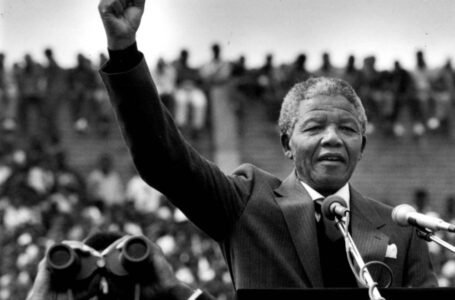Tukaram: The Devotional Poet and Social Reformer
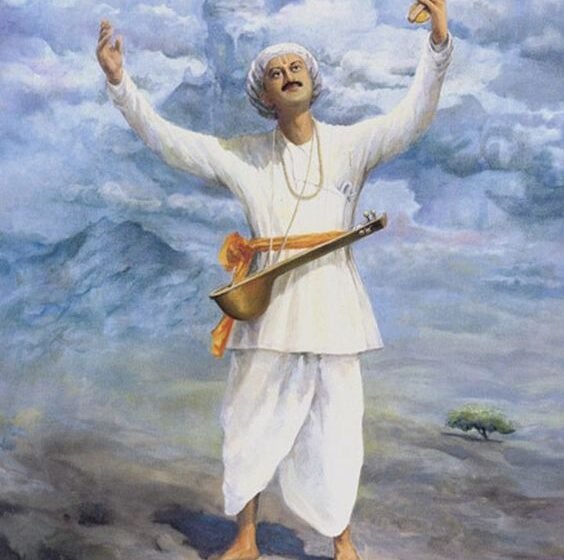
Sant Tukaram Maharaj, also known as Tuka, Tuko Baraya, and Tukoba, was a 17th-century Marathi saint who left an indelible mark on the Bhakti movement in Maharashtra. His life was dedicated to devotion, poetry, and social reform. Tukaram was born in Dehu village, Maharashtra, around 1598 or 16081. His unwavering devotion was directed towards Vithoba, the beloved deity of Pandharpur.
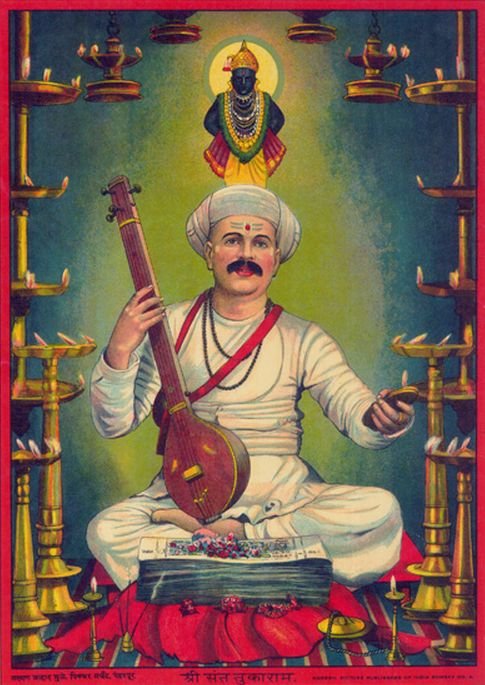
Tukaram’s spiritual quest led him to compose Abhang, a form of devotional poetry that resonated with the masses. His verses were not only soul-stirring but also carried powerful messages of social transformation. Abhanga Poetry: Tukaram’s Abhanga compositions are jewels of Marathi literature. These soulful verses celebrated Vithoba, love, and the human experience. Through simple language and heartfelt expressions, Tukaram touched the hearts of common people.
Social Reformer: Tukaram fearlessly pointed out the flaws in society, challenging oppressive norms and practices. His kirtans (spiritual songs) and abhangs (poems) echoed his commitment to justice, compassion, and equality. Spiritual Legacy: Tukaram’s legacy extends beyond his lifetime. His teachings influenced generations of seekers, emphasising faith, devotion, and the realisation of God within. His pantheistic Vedantic view emphasised that the entire universe is filled by God.

Literary Heritage: His Abhanga poetry continues to inspire artists, writers, and musicians. Social Awakening: Tukaram’s courage to challenge societal norms paved the way for positive change. Devotion Lives On Devotees still flock to Pandharpur, singing Tukaram’s kirtans and seeking solace in Vithoba.
Here are some of his notable Abhang: The title translates to “The Source of Om.”
In this devotional song, Tukaram Maharaj beautifully expresses the essence of the sacred syllable “Om” and its significance in spiritual practice. Composed between 1632 and 1650, this Marathi language compilation includes approximately 4,500 abhang. Tukaram’s Gatha celebrates devotion, love, and surrender to Vithoba, a form of Lord Vishnu. It weaves folk stories with profound spiritual themes. Tukaram’s abhang are like strings of pearls, each carrying a unique message. His verses emphasise inner transformation, ethical conduct, and liberation over ritualistic practices.
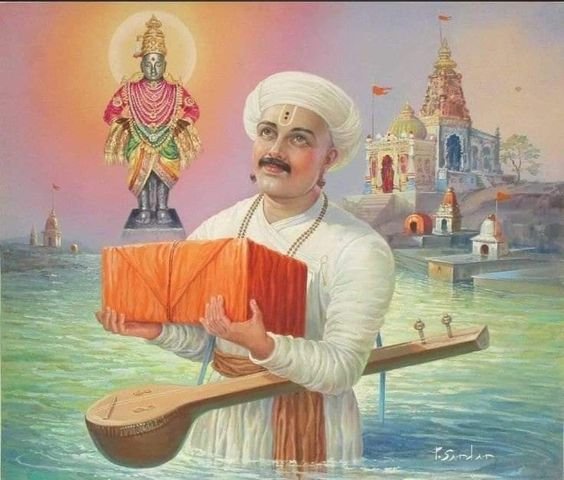
Through simple language and vivid imagery drawn from everyday life, Tukaram touched the hearts of common people. The essence of his devotional compositions: Tukaram’s abhangs serve as a testament to his love and devotion for Lord Vitthal (an incarnation of Lord Krishna). Through poetic verses, he expresses his longing to merge with the divine, experiencing the bliss of union with God.
The importance of surrendering oneself to the divine will. He encourages seekers to embrace humility, recognizing their insignificance in the vastness of the universe. Tukaram’s abhangs offer guidance on the spiritual journey. He stresses that liberation is not attained through external rituals alone but through inner transformation and realisation of the divine within. Tukaram advocates for compassion, kindness, and equality among all beings. His abhangs highlight the significance of seeing the divine in every living being and treating others with love and respect.
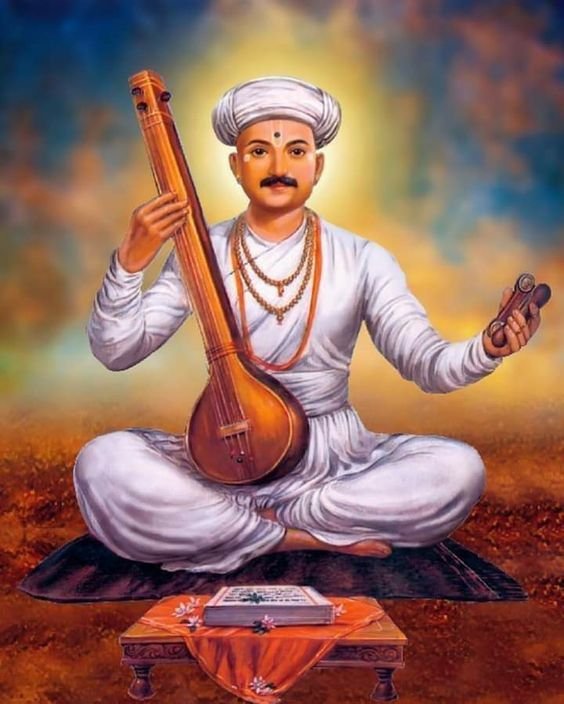
Tukaram was born into the Sudra caste, a successful merchant, and a devoted family man. His life took a profound turn during a severe drought that plagued the region. Crop failure, hunger, and desperation gripped the people. Tukaram’s stored grain and savings were depleted, leaving him destitute. Relatives who once respected him now scorned him. Stripped of worldly success, Tukaram faced a divine test: to turn away from earthly attachments and seek the Inner Self.
Rather than despair, Tukaram embraced vairagya—even-mindedness in the face of opposites. He rebuilt a dilapidated temple dedicated to Krishna as Panduranga. There, he celebrated Ekadashi—the blessed eleventh day of each fortnight—with unwavering devotion. But Tukaram’s compassion extended beyond rituals.
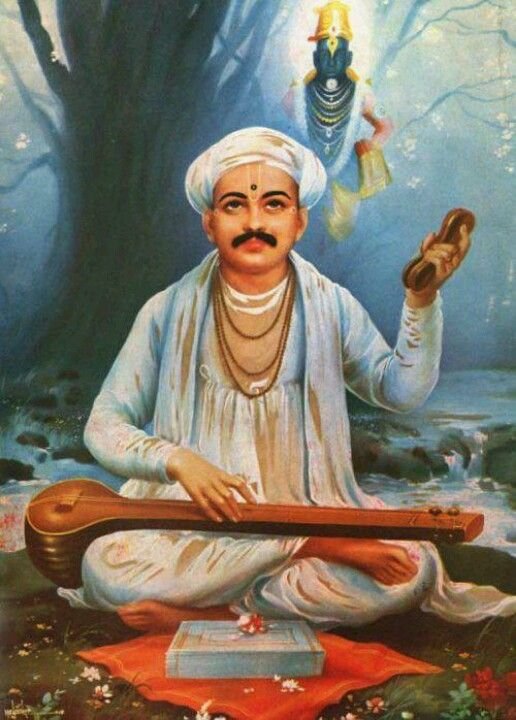
Tukaram’s abhangs devotion, compassion, and equality. He fearlessly challenged societal norms and advocated for justice. Shivaji Maharaj, too, believed in justice and fairness. He established a just administration that treated people of all backgrounds equally. Shivaji Maharaj’s rule focused on uplifting the common people, empowering women, and promoting education. Tukaram’s devotion to Vithoba was unwavering, yet he recognized the divine in everyday life. Shivaji Maharaj balanced his military and administrative duties with reverence for saints and spiritual leaders. Shivaji Maharaj united various Maratha clans and communities to create a strong and resilient kingdom. Tukaram’s legacy continues through his poetry, inspiring artists, musicians, and seekers also Shivaji Maharaj’s legacy as a just ruler and visionary leader remains influential in Indian history.
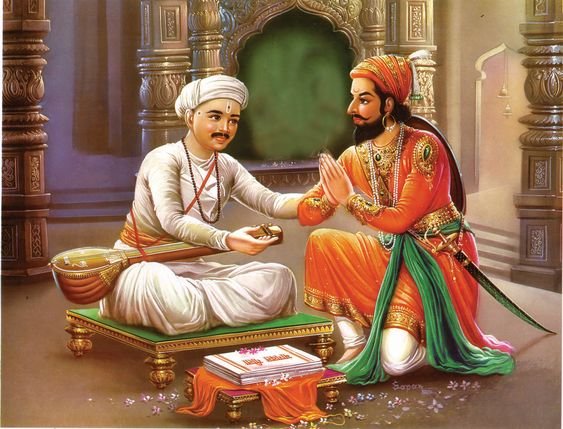
Travellers: Tukaram welcomed travellers into the restored temple.
Feeding the Hungry: Even when he had nothing, he sought food for the hungry.
Relieving the Burdened: He massaged weary travellers and helped them rest.
Caring for Cows: Abandoned cows and bullocks found solace in his touch.
Reverence for Bhaktas: Tukaram humbly washed the feet of Vishnu devotees.

Tukaram’s life exemplified the holy mission—to learn life’s lessons and share God’s blessings, even amidst personal loss. His inner strength and compassion transformed adversity into spiritual growth. Society witnessed both his unwavering faith and his selfless service and also his legacy endures, reminding us that true spirituality transcends material success. His radical ideas continue to inspire seekers, urging them to seek the infinite light within and after that he underwent a profound transformation that left an indelible mark on his life and those around him. Let’s explore how his family responded to this remarkable change:
During a severe drought that plagued the region, Tukaram faced immense challenges. His stored grain and savings were depleted, leaving him destitute. Relatives who once respected him now scorned him. Stripped of material success, Tukaram faced a divine test: to turn away from earthly attachments and seek the Inner Self.
Rather than despair, Tukaram embraced vairagya—even-mindedness in the face of opposites. He rebuilt a dilapidated temple dedicated to Krishna as Panduranga. There, he not only celebrated rituals but also extended compassion to others:
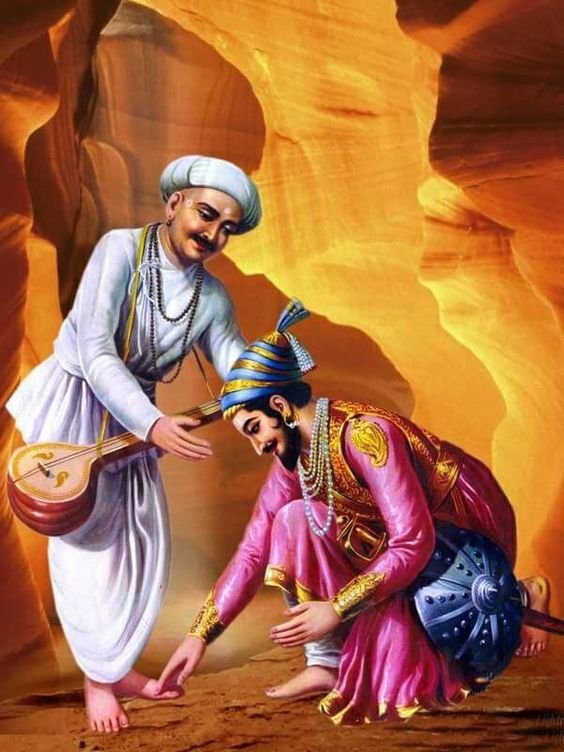
Lodging Travellers: Tukaram welcomed travellers into the restored temple.
Feeding the Hungry: Even when he had nothing, he sought food for the hungry.
Relieving the Burdened: He massaged weary travellers and helped them rest.
Caring for Cows: Abandoned cows and bullocks found solace in his touch.
Tukaram’s family witnessed his transformation—from a prosperous merchant to a compassionate devotee. While some may have been puzzled or concerned, others recognized the depth of his devotion and the impact he was making on society.
Jijabai (Second Wife)
Tukaram’s second wife, Jijabai, found his actions perplexing. She believed her husband had lost his mind. Tukaram implored her to be patient, feeling he had no other choice. His unwavering commitment to rebuilding the temple in service to God baffled Jijabai, but she witnessed the depth of his devotion and the impact he was making on society.
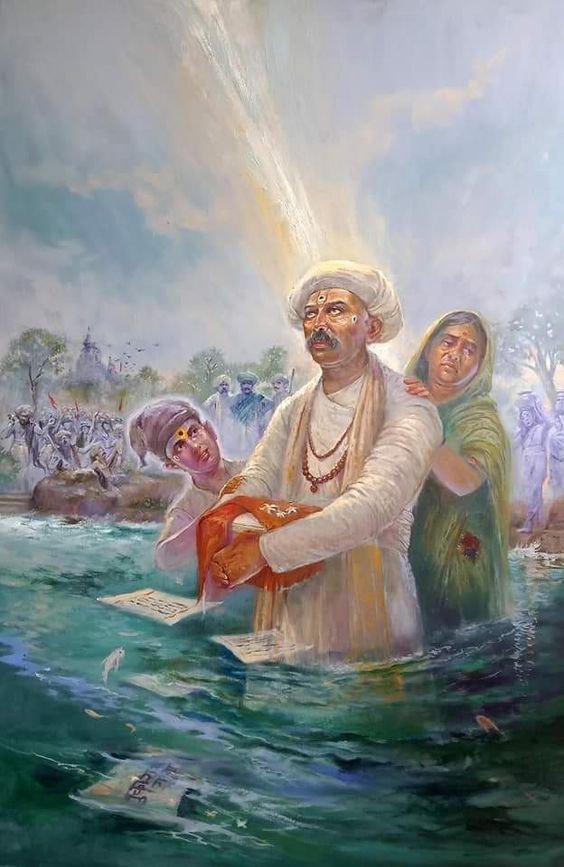
Jijabai (Second Wife):
Tukaram’s second wife, Jijabai, found his actions perplexing. She believed her husband had lost his mind due to his radical transformation.
Despite her initial confusion, Jijabai witnessed the depth of Tukaram’s devotion and the impact he was making on society. Her support played a crucial role in his spiritual journey.
Children:
Tukaram had six children:
Daughters: Kashibai, Bhagirathi, and Gangabai.
Sons: Mahadev, Vithoba, and Narayan (born four months after Tukaram’s death).
While some of his children may have struggled to comprehend their father’s path, others recognized the spiritual fire burning within him.
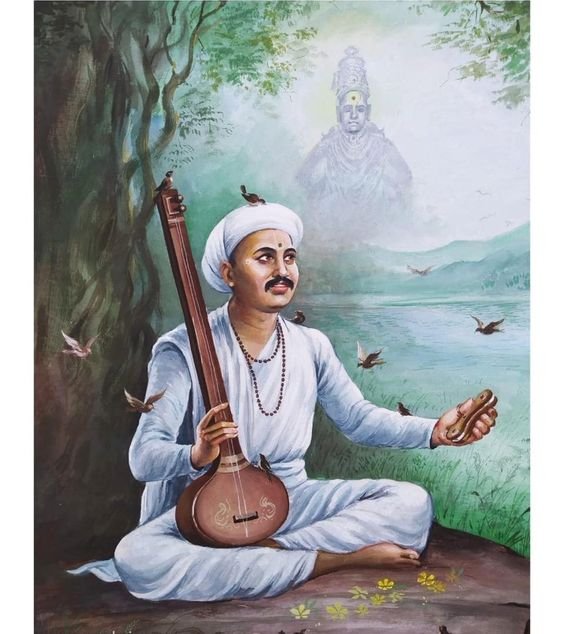
Tukaram’s legacy lived on through his family, who continued to spread his teachings and uphold his devotion to Lord Vitthal.
Tukaram Maharaj left an indelible mark on Marathi literature and spiritual thought. His abhangs—heartfelt devotional compositions—continue to inspire and uplift people across generations. Tukaram’s message of love, devotion, and morality remains relevant in today’s world, reminding us of the timeless pursuit of self-realisation and the boundless grace of the divine. Through his verses, he invites us to embark on a journey of self-discovery, compassion, and unwavering faith. Tukaram Maharaj’s legacy endures, echoing the eternal call to seek the infinite within ourselves and connect with the divine source of all existence.

